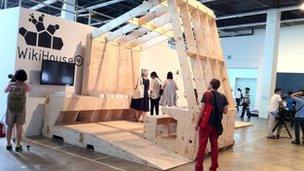TEDGlobal: Smart city ideas awarded at TED
- Published

The wiki-house uses locally sourced materials and open-source designs
Developers with innovative ideas about how the cities of the future should look have been honoured at the TEDGlobal conference in Edinburgh.
This year's TED (Technology, Entertainment, Design) prize, normally given to an individual, was awarded to an idea dubbed "City 2.0".
Ten projects that are improving city life were selected to benefit from the $100,000 (£64,300) prize fund.
Winners include a designer of an open-sourced "wiki-house".
The first winner, announced at the TEDx summit in the spring, was Ruganzu Bruno who will be using the money to create a play centre, built entirely from plastic water bottles, for children in the slums of Uganda to play and learn.
Four of the winners were announced at TEDGlobal, while the rest to be revealed in the autumn.
All of the projects are outlined on the <link> <caption>City 2.0 website</caption> <url href="http://www.thecity2.org/projects" platform="highweb"/> </link> .
Self-built houses
One of the winners, designer Alastair Parvin from the design practice 00:/, wants to see a more democratised approach to house building.
"For too long, cities have been made by the 1% and consumed by the 99%. We wanted to see what it would take to create something that would allow the 99% to make cities for the 99%."
With this in mind, he and fellow designer Nick Ierodiaconou created a blueprint that would allow ordinary people to build their own homes using open-sourced designs and locally-sourced materials.
They posted their designs and assembly directions online and encouraged anyone to try it out, add to it, and upload their own ideas. Since they first initiated the project, five prototypes have been assembled.
Mr Parvin aims to team up with youngsters in Brazil and will use the money to allow them to build their own communal wiki-houses in the favelas of Rio.
Improved drains
Another of the winners, Faisal Chohan, is working on a project to clean up the water in Pakistan's fourth largest city, Rawalpindi.
The city sustains a population of two million but, despite government attempts to provide proper sanitation, more than 90% of the city still lives with open drains.
"Every house provides unrestricted access to all kind of insects, including rats up to 12-inches [30.5cm]," said Mr Chohan.
"The water remains stagnant in streets. First thing out of doors is an unbearable smell. The same drainage passes openly through the main markets of the city where 90% of the people do shopping."
According to the World Health Organisation, more than 30% of all deaths in the city are directly caused by contaminated water. In infants this increases to 40%.
Everyday citizens
Working with the local community, Mr Chohan is planning to map the city's drainage system and offer the maps up to the local and wider online community to find solutions.
Mr Chohan and his tech team will train everyday citizens to map the flow of water in their local areas, give them bicycles so they can get around, and mapping devices so they can register their findings.
As well as increasing public health literacy, the system will also act as a warning system for areas of potential cholera outbreaks and hopefully allow for action to prevent them.
For him, making cities better places to live means going back to basics.
"At the moment it is not a priority for the government or the people. They see it as too big a problem and I want to change that mentality," he told the BBC.
Past winners of the TED Prize include chef Jamie Oliver and U2 frontman Bono.
It was also announced at the conference that the 2013 prize fund would be increased from $100,000 to $1m.
- Published26 June 2012
- Published26 June 2012
- Published25 June 2012